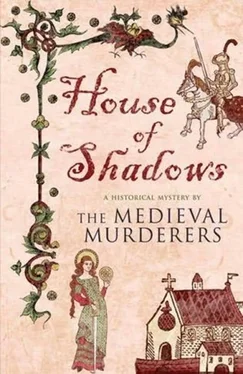‘Have you been working on a cellar recently?’
At once Andrew turned wary. ‘A cellar, sir?’
‘Mistress Morton told me that was where her husband caught his fever. She said it was a cursed spot.’ Chaucer said nothing about the ring in his pocket which might have been retrieved from the cellar.
‘Oh, that place,’ said Andrew. He seemed to debate with himself whether to elaborate, then said: ‘Yes, Master Chaucer, there are all sorts of tales told of it. I don’t believe the prior himself would venture down there after dark – though it’s always dark down there, of course. Yes, it’s true. John and Simon were sent down to do some repairs by the cellarer, Brother Michael.’
‘But not you or Will?’
‘Will is a delicate creature. In truth, he is not fitted for much. Me and the boy were seeing to another job – a boundary wall. I prefer to work outside.’
‘Not Adam either, the one-handed man? He wasn’t working down in this cellar?’
‘I tell you, Master Chaucer, Adam had been with us only a couple of days since Simon fell sick. I didn’t know him from, well, didn’t know him from Adam.’
Geoffrey sensed the mason’s unease – or perhaps it was simple impatience with his string of questions. And, indeed, he could not have said exactly why he was asking them.
‘Where is this, ah, cursed spot?’
‘It lies under the cellarer’s chamber on the other side of the cloister.’
Since the cellarer was the person in overall charge of provisioning, naturally there would be storage areas under his part of the priory. Geoffrey might have gone on to enquire exactly what ‘tales’ were told about the cellar, but at that moment there was a strange flurry of sound and Prior Dunton burst into view, accompanied by Brother Peter the librarian with other monks trailing behind. They were walking fast but turning to look behind them. At first Chaucer thought they were being pursued but, seeing him and Andrew, Richard Dunton changed direction.
‘You’ve caught him? Or he’s escaped, the murderer?’ said Chaucer. He could think of no other reason for the strained expression on the prior’s face.
‘Oh, he has been caught – or escaped if you like,’ said Richard Dunton. ‘He’s over there. In our cemetery. He’s dead, too, now. Come and see.’
At this point, or shortly afterwards, Richard Dunton became concerned at the two deaths at Bermondsey Priory, not so much because of the events themselves but because of their effect on the priory’s standing and reputation. Two violent deaths, with the second coming hard on the heels of the first. At least the claw-handed Adam had had the foresight to die in a cemetery. Or rather he had been struck down there. Or had struck himself down. He’d climbed a tree in the graveyard, wrapped one end of a rope about his neck and the other around a branch. Then he’d toppled off the branch and hung there, slowly throttling.
Dunton and Chaucer had stood looking up at the body suspended from the branch of an oak. The face was livid, and the man’s tongue poked like a stick out of his almost toothless mouth. His torso shivered and his feet swayed in the breeze. A few paces behind them stood Brother Peter, the librarian and sacrist. Chaucer had been surprised to learn that, in addition to his other duties, Brother Peter had charge of the burial ground. He was muttering and crossing himself at the sacrilege of a man committing suicide in the bounds of the cemetery. Keeping him company was the moon-faced monk who had the post of revestiarius.
‘Well, he has met a quick retribution,’ said Geoffrey.
‘It had been better to have him arrested and brought to trial,’ said the prior.
Geoffrey didn’t remark that the result would have been the same: a noose tightening about Adam’s neck until he expired. Nevertheless, Dunton was right. It would have been much better if the murderer of John Morton had been apprehended in the proper fashion. Now it rather looked as though the murderer had taken the law into his own hands. Geoffrey reached up and touched the trailing end of the black girdle wound about the dead man’s neck. It was similar to the girdles that the monks used to secure their dark garments.
Richard Dunton was no fool. He nodded and said: ‘I can see where your thoughts are directed, Geoffrey. But it would not be so difficult to come by one of those cords. It is obvious what has happened here.’
‘It is?’
‘This man Adam, overcome by remorse, flees to the cemetery, where he plans to die. He is already equipped with the cord that will snuff out his wretched life. While we are searching the place for him, he is quietly preparing himself for death. Remember Judas the Apostate, who hanged himself from a tree after betraying our Saviour. Remorse can call on the most unlikely men, and call quickly and unexpectedly too.’
‘Judas had the use of his two hands, I believe,’ said Geoffrey, indicating the withered hand of the man swaying from the oak.
‘Men in despair can accomplish great and terrible things,’ said the prior.
Yes, thought Chaucer, but not impossible things like clambering up an oak, crawling along a branch, fastening one end of a cord about his neck and the other around the branch, all the time employing only one hand. However, he could not have said for certain whether the dead man did not have some limited use of his left hand, and the prior was surely correct when he claimed that men in desperation can do things they’d be incapable of in normal circumstances.
‘If only he had chosen some other place,’ said Brother Peter, speaking aloud for the first time. ‘Why did he have to choose this sanctified ground?’
‘Hush now, Brother Peter. The circle is closed,’ said Dunton. ‘This man killed another man and now he has done away with himself, God rest both their souls. We must cut him down.’
He beckoned to a gaggle of lay workers who’d been standing at a distance, out of respect for the prior or the dead man or both.
‘But why did he kill John the mason?’ said Chaucer as they left the cemetery while the murderer’s body was being cut down.
‘I do not know. You were there. A quarrel, wasn’t it?’ The prior suddenly broke off and said in a more anxious tone: ‘You intend to report on this back at court, Geoffrey?’
And Chaucer, who’d been thinking of no such thing, said: ‘You cannot keep it a secret.’
The reality was that, at court, no one would be remotely interested in a spat between a couple of artisans which had resulted in a murder and an apparent suicide. But it seemed to Geoffrey that Dunton had been too quick to declare the matter closed. If the prior hadn’t been worried for the reputation of his house, he began to show some concern now.
‘Very well, Master Chaucer, if you consider that there is anything…untoward…about this sad affair, then you are welcome to pry into it and ask questions. I know how much influence you have at court. Go where you like. Talk to whomever you wish. I shall even give the brothers dispensation if you need to speak to any of them. Ask away to your heart’s content and satisfy yourself that this case is exactly what it seems, a vicious man who hanged himself after being overcome by remorse. Meanwhile, the life of this place must continue as though nothing has happened.’
Chaucer noticed the coolness and relative formality in Richard Dunton’s tone. He thought that the prior was overestimating his influence at court but, of course, he didn’t say so. It was a touchy subject. Any influence was largely because of the connections between his wife Philippa, her widowed sister Katherine Swyneford and John of Gaunt himself. Officially Katherine was resident in the Savoy Palace as magistra to Gaunt’s children by his first wife, and unofficially she was there as Gaunt’s mistress. The magistra pretence was necessary for Katherine because Gaunt’s second wife – the noble Constanza, from the kingdom of Castile – lived under the same ample roof. It was because of her sister Katherine’s status that Philippa Chaucer and her family had been given choice lodgings on the south side of the palace overlooking the river, even though they’d recently moved back to Aldgate.
Читать дальше












